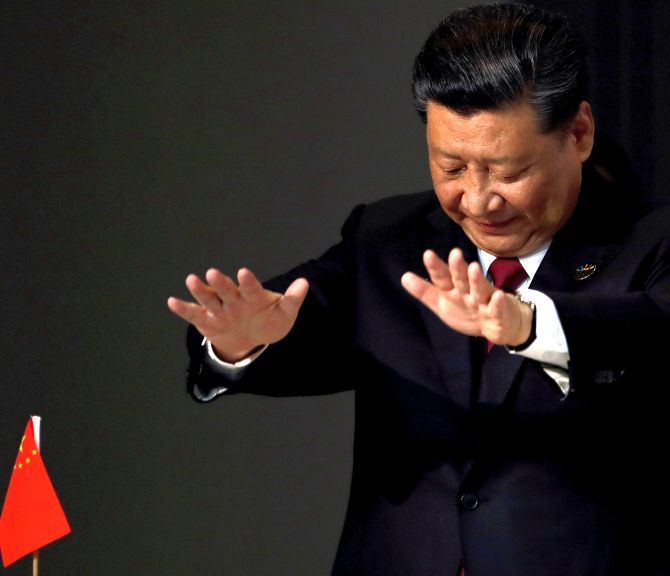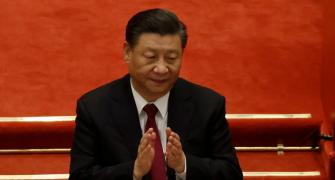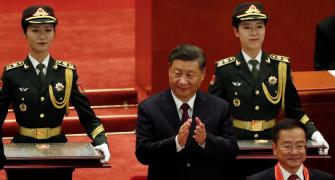President Xi Jinping has called for better international communication, urging the bellicose official Chinese media and 'wolf warrior' diplomats to adopt a tone that displays openness and conveys modesty, in what observers see as a rare admission of Beijing's growing isolation exacerbated by COVID-19.

Xi, 67, who carries the image of being the most powerful Chinese leader after 'Chairman' Mao Zedong with possible life-long tenure in power, in a candid conversation at a group study session of the Politburo of the ruling Communist Party of China (CPC) on Monday said, new concepts, domains and expressions should be created to tell China's stories in a better way.
In a comment seen as an expression of dissatisfaction with the current lot of 'wolf warrior' diplomats and bellicose official media outlets, Xi spoke of the need for conveying the message with modesty and humility.
Xi said a tone that displayed openness, confidence and conveyed modesty and humility must be maintained, the state-run China Daily said in its report on the speech.
China needs a voice that matches its national strength and international status, it said.
"It is necessary to give better play to the role of high-level experts and use platforms and channels such as important international conferences and forums and foreign mainstream media to speak out," Xi said.
He also emphasised the efforts to introduce the Chinese culture abroad and strive to shape a reliable, admirable and respectable image of the Communist giant.
"It is necessary to make friends, unite and win over the majority, and constantly expand the circle of friends [when it comes to] international public opinion," Xi was quoted as saying.
Asked whether China will take a different approach in its diplomatic efforts in the light of Xi's remarks, Chinese Foreign Ministry spokesman Wang Wenbin told a media briefing here on Wednesday that the comments were in line with China's 'peaceful development'.
"I want to stress that enhancing and improving our international publicity work and better build our capability in international publicity will help China to create a more favourable external environment for our reform and development," he said.
"This is in line with what we need for China's peaceful development as well as reform and opening up. It is also conducive to the trend of peace and development. It is both in the interest of China and beyond," Wang said.
Significantly, Zhang Weiwei, who served as an English interpreter for Deng Xiaoping, the moderate Chinese leader who succeeded Mao Zedong, was chosen to make a presentation on the status of China's communication at the meeting presided over by Xi.
Zhang, the director of the China Institute of Fudan University in Shanghai, gave advice for relevant work and the CPC leaders listened to his presentation attentively, the state-run Xinhua news agency reported without disclosing details.
Chinese diplomacy and the official media have undergone a makeover ever since Xi came to power in 2012, becoming the leader of the CPC, the military and the Presidency.
Since then, China's diplomacy acquired a more aggressive tone while the official print and television media modernised on a scale and speed not seen before, and sought to forcefully push China's narrative on contentious issues.
The tone of the official media, especially by the CPC-run publications like the tabloid Global Times, has become increasingly belligerent, amid Beijing's adverse international image following the emergence of the deadly coronavirus in Wuhan in 2019 which later became a horrific pandemic, resulting in over three million deaths globally.
China is also aggressively pushing its narratives to counter the international pushback on the disputed South China Sea, allegations of the genocide of Muslim Uygurs in Xinjiang, repression of Tibetans in Tibet and the imposition of Beijing's national security law over Hong Kong against massive opposition from local people.
Xi's remarks came amid China's deepening feud with the US and negative perceptions of China at record high levels in many parts of the world, the Hong Kong-based South China Morning Post reported on Wednesday.
Chinese observers said Xi's call was a rare admission of Beijing's isolation that has been exacerbated by aggressive 'Wolf Warrior' diplomacy and ineffective propaganda and influence campaigns abroad, the Post report said.
His comments also suggest how Beijing will seek to shift the unfavourable narratives in its ideological and geopolitical wrangling with Western democracies, it said.
Commenting on Xi's speech, Beijing-based analyst Wu Qiang said: "China is facing the worst international isolation since the reform and opening-up in the late 1970s, but it seems the leadership has not been able to find any solutions."
"Xi has effectively admitted the failure of China's external communications and the country's isolation, which could be attributed to a lack of convincing communications strategies and good China stories," Wu told the Post.
"But I don't think there will be any change to the assertive diplomatic approach apart from some fine-tuning," he said.
Gu Su, a political scientist at Nanjing University, said poor communication and combative diplomats were holding back China's efforts to fix its image.
"Xi's remarks appear to be related to Washington's move to use an international investigation into the origins of the coronavirus to target China, which has gained momentum in recent weeks," he said.
"While it's good that state leaders realise the problems we face, it would be naive to expect the media can make a big difference to how China is perceived around the world," he said.
Gu said an overhaul of foreign policy was needed, and polishing its communications strategy would not be enough for China to improve relations with other countries.
Xi's remarks 'can be seen as a general assessment of global opinion on China, which is far from satisfactory', Post quoted an expert, who declined to be named.
In view of Xi's well-publicised comments in the official media, speculation is rife whether there will be a change of tone and tenor of Chinese diplomacy and the official media in its communication with the world.









